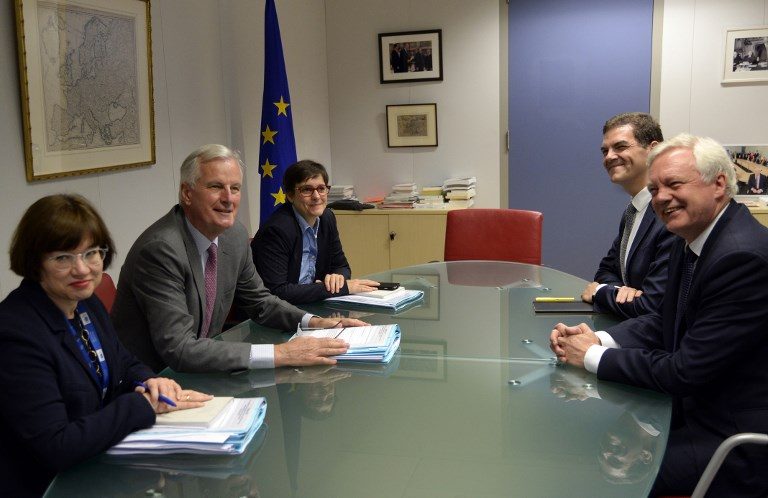SUMMARY
This is AI generated summarization, which may have errors. For context, always refer to the full article.

BRUSSELS, Belgium – Britain and the European Union said they would get to the “heart of the matter” as they launched a fresh round of fraught Brexit negotiations in Brussels on Monday, July 17.
Brexit minister David Davis met Michel Barnier, the EU’s chief negotiator, to try to push through a deal ahead of Britain’s withdrawal from the bloc, scheduled for March 2019.
During 4 days of talks the two sides hope to make progress on key issues surrounding Britain’s withdrawal, including citizens’ rights and its exit bill, so that talks can move on to discuss a future trade deal later this year.
“Now it’s time to get down to work and make this a successful negotiation,” Davis told reporters as Barnier welcomed him to the headquarters of the European Commission.
“For us it’s incredibly important we now make good progress, that we negotiate through this and identify the differences so we can deal with them and identify the similarities so that we can reinforce them.”
Barnier, who has repeatedly called on weakened British Prime Minister Theresa May to quickly set out her divorce strategy, said they needed to “examine and compare our respective positions in order to make good progress.”
“We’ll now delve into the heart of the matter,” Barnier told reporters, declining questions until the end of this round of talks on Thursday.
No ‘whistling’, just ‘ticking’
The talks are the first full round of negotiations that formally began last month with a one-day session to agree on a timetable.
The EU has demonstrated increasing confidence in recent weeks, accusing Britain of dithering over whether it wants a “hard” or “soft” Brexit more than a year after the shock referendum that propelled May to power.
Brussels insists it will only start discussing the future relationship once there has been “sufficient progress” on the divorce — an estimated 100-billion-euro ($112 billion) exit bill, the rights of three million EU citizens living in the UK, and the border in Northern Ireland.
This week’s talks are also set to address more detailed concerns such as Britain’s future in Euratom, the EU’s nuclear safety agency, and the role of the European Court of Justice, the EU’s top court.
EU leaders are set to decide at a summit in October whether there is enough common ground to move on to trade talks.
Common ground was very much lacking last week after British foreign minister and leading Brexiteer Boris Johnson remarked that the EU could “go whistle” over its massive Brexit bill demand, drawing a rebuke from Barnier.
“I am not hearing any whistling, just the clock ticking,” said the former European Commissioner and French foreign minister.
Johnson, who was in Brussels on Monday separately to meet his 27 EU colleagues, said he hoped the bloc would accept the “very fair and serious offer” Britain had made on the rights of EU citizens.
“I hope very much that people will look at that offer in the spirit it deserves,” he told reporters.
UK finance minister Philip Hammond said Sunday that Britain will take responsibility for the money it owes, but dismissed the 100 billion euro figure as “ridiculous”.
Barnier last week held a series of meetings in Brussels with British opposition Labour leader Jeremy Corbyn and other UK figures at odds with May.
They are all deeply wary of May’s hardline approach that would see the UK leave the EU without full access to the bloc’s single market of 500 million people, in order to curb free immigration from the bloc.
‘Power grab’
May’s minority government remains fragile one month after the snap June 8 election in which her Conservative Party lost its majority, forcing it to seek an alliance with Northern Ireland’s small ultra-conservative Democratic Unionist Party.
The tensions have shaken the British government, which on Thursday introduced the draft law that would formally put an end to Britain’s membership of the European Union.
May faces a battle over the bill, which opponents said included a dangerous “power grab” by London at the expense of Scotland and Wales.
Hammond, a potential rival to May, acknowledged that ministers were divided on many elements of Brexit, after weekend newspapers were filled with reports of infighting.
“I think on many fronts it would be helpful if my colleagues – all of us – focused on the job in hand. This government is facing a ticking clock over the Brexit negotiations,” Hammond said. – Rappler.com
Add a comment
How does this make you feel?





There are no comments yet. Add your comment to start the conversation.